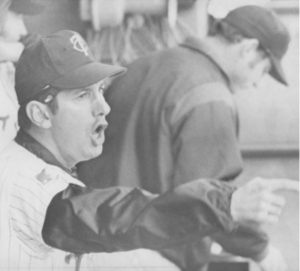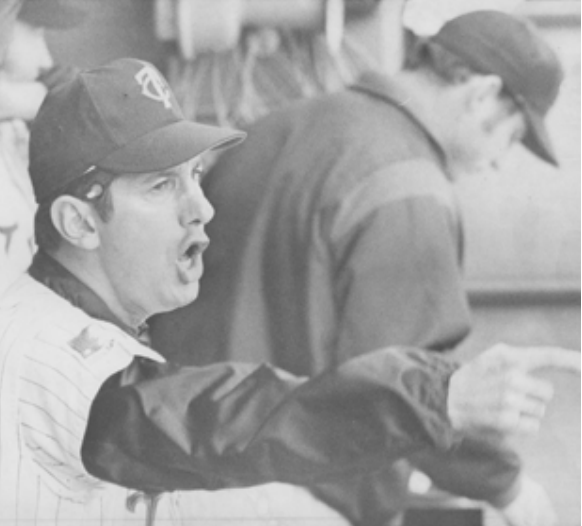October 6, 1969: Twins play first playoff game at Metropolitan Stadium; Orioles clinch AL pennant
 The Minnesota Twins returned home with their backs to the wall. They lost the first two games of the first American League Championship Series to the Baltimore Orioles. Both games had gone into extra innings.
The Minnesota Twins returned home with their backs to the wall. They lost the first two games of the first American League Championship Series to the Baltimore Orioles. Both games had gone into extra innings.
The Twins had the lead in the first game until the ninth when the Orioles tied the score. Baltimore eventually won it on Paul Blair’s single in the bottom of the 12th. The two teams battled to a scoreless tie through 10 innings in the second game before Baltimore scored the winning run in the 11th off Ron Perranoski, the loser of the first game.
Twins manager Billy Martin chose Bob Miller to start when the two teams took the field at Metropolitan Stadium. Miller had finished the season with a 5-5 record. He had been used as a starter and reliever all season.
Many fans wondered why Martin was using right-hander trailing two games to none “instead of the gutty competitor Jim Kaat.”1 Martin responded to his critics, saying, “I don’t think that it reflects anything on any of our other pitchers. Let’s just say that Miller is a low-ball pitcher and the Orioles are a good high-ball-hitting club.”2
Prior to the 1969 season, Miller had contemplated retiring. “I talked to Billy. He told me to come on down to Orlando [the Twins’ spring-training home]. That he was going to use me.”3 Miller responded with a fine season in the majors as Martin used him in crucial situations.
Miller started shakily. He surrendered consecutive singles to Don Buford and Blair in the first inning. He rebounded to get a force out and double play, preventing any Baltimore baserunners from crossing the plate.
The Twins gave their fans hope that they would make a comeback when they scored off Baltimore starter Jim Palmer in the bottom of the first. Palmer got the first two batters to ground out before giving up a double to Tony Oliva. Oliva reached third on a wild pitch and scored on Rich Reese’s single to give the Twins a 1-0 lead.
When Miller took the mound in the second, he struggled again. Brooks Robinson led off with a double. Robinson reached third when Oliva slipped and then dropped Davey Johnson’s pop fly.
Oliva was playing injured. He had hurt his throwing arm in the final play of second game as he tried to keep Boog Powell from scoring. Martin had considered keeping him out of the game but Oliva had insisted on playing.
“I couldn’t throw the ball. I couldn’t lift my arm high enough to swing the bat. I couldn’t throw the ball two feet. But I insisted that Billy play me because this was such an important game,” he said afterward.4
With runners on first and third, Elrod Hendricks doubled to center field. Hendricks reached third when Cesar Tovar tried to throw out Johnson at home. After Miller got the next two batters out on fly balls, Buford singled to score Hendricks, giving Baltimore a 3-1 lead.
Martin replaced Miller with Dick Woodson, who struck out Blair to end the inning. It was the only time all afternoon that Blair failed to connect for a hit.
As the Orioles took the field in the bottom half of the inning, Orioles manager Earl Weaver filed a protest with home-plate umpire Frank Umont. Weaver claimed the Twins were “cheating” by placing a man in the outfield scoreboard to call the pitches.5
“We had Curt Motton in our dugout with field glasses. Motton observed that there was a head bobbing out there [in a hole in the scoreboard]. The man had his arms up high when the pitch was a curveball and down low when it was a fastball,” said Weaver.6
His protest was denied. Umont told Weaver that the man was working and could stay out there if he wanted. Weaver later noted that after the protest “the man in the scoreboard disappeared.”7
The Twins were robbed of a scoring chance in the bottom of the third when Buford made a spectacular backhanded catch on Carew’s drive to left. The play seemed to give Palmer and the Orioles a lift.
Baltimore built on its lead in the fourth. Light-hitting Mark Belanger led off with a triple. Woodson walked Buford. Blair then doubled and both baserunners scored. Frank Robinson walked, finishing Woodson. Tom Hall retired the next two batters but the Orioles now led by four runs, 5-1.
Blair had made some adjustments at the plate after struggling at the end of the season. Hitting coach Charlie Lau sat him down and reviewed films before the game. “They showed that I had been taking a lot longer stride recently. I just took a shorter stride and started hitting again,” Blair said.8
A triple by Leo Cardenas in the Twins’ fourth went for naught, but Minnesota notched its second tally in the bottom of the fifth. Harmon Killebrew doubled to center field with two outs. He came home when Reese hit his second single of the game.
Baltimore’s advantage swelled to four runs in the sixth. Buford doubled off Al Worthington, the fourth Twins pitcher of the game. Buford moved to third on Blair’s second single and scored when Frank Robinson followed with a single that made the score 6-2 and chased Worthington from the game.
Buford had also spent time with Lau watching game films and it was paying off. “The first two games they pitched me inside – jammed me with hard pitches,” he said. “Basically what I did was move away from the plate more and concentrate so that those inside pitches looked like they were over the plate.”9
After a single by Cardenas in the sixth, Palmer shut down the Twins for the next 2⅔ innings. Although it was not Palmer’s best performance, he didn’t need to worry. Every one of his teammates got in the act as the Orioles notched 18 hits with Blair and Buford accounting for half of them.
Blair led with the way with five hits, the fourth coming in the eighth when he homered off Dean Chance. Chance, a former 20-game winner, had been scratched from a starting role because of an injury. He pitched a faultless seventh before Blair homered behind a Buford single. The home run expanded the Orioles’ lead to six runs at 8-2.
Martin sent Perranoski to the mound in the ninth after Chance gave a leadoff hit to Johnson. Perranoski was the seventh Twins pitcher. While the left-hander had been the anchor of the Twins bullpen that year, finishing with 31 saves and a 2.11 earned-run average, he had failed to shut down Baltimore in the previous two games.
Hendricks lined a pitch down the line past first that looked like an apparent double. Johnson scored. Oliva ran the ball down and threw it to Carew. His throw bounced past Carew and Reese, the first baseman, had to run out to right field to retrieve it. The error allowed Hendricks to circle the bases and score the Orioles’ 10th run.
The fans at Metropolitan Stadium began booing. The Twins had not made any announcement about Oliva’s injury so fans were frustrated with their team’s play. Oliva expressed his disappointment with the fans, saying “This is the first time this happened to me. Why they do this to me? I play good all year – and then this.”10
After surrendering a single to Belanger, Perranoski got the next two outs. Blair now strode to the plate and hit a line drive down the right-field line. Oliva seemed reluctant to catch the ball and Blair ended up on second with his second double and fifth hit of the game.
With the score now 11-2, the Twins were down to their final three outs. Palmer gave up a single to John Roseboro before striking out Cardenas. Pinch-hitter Graig Nettles singled, giving fans one last bit of hope that their team might make a comeback.
But Palmer got the next two batters out. The win sent the Orioles to the World Series. Palmer, who earned the complete-game victory, said afterward, “I struggled and didn’t have good rhythm. But after the fifth inning I got my rhythm and was able to pop the ball. The big lead didn’t hurt me either.”11
The Twins finished with 10 hits, three more than their total in the first two games. But “they played with the unaccustomed attitude of the underdog.”12 It was a disappointing finish to their season.
As the team looked forward to 1970, the biggest question was whether Martin would return as their manager. He had fought with management over his combative and outspoken managing style. When asked what the Twins needed next season, Martin said, “A new manager.”13
Sources
In addition to the sources cited in the Notes, I used the Baseball-Reference.com and Retrosheet.org websites for box-score, player, team, and season pages, pitching and batting game logs, and other pertinent material.
baseball-reference.com/boxes/MIN/MIN196910060.shtml
retrosheet.org/boxesetc/1969/B10060MIN1969.htm
Notes
1 Tom Briere, “Martin Stands Firm Against Second Guess,” Minneapolis Tribune, October 7, 1969: 24.
2 Dave Mona, “Miller Pitches for Twins Life,” Minneapolis Tribune, October 6, 1969: 36.
3 Mona, “Miller Pitches for Twins Life.”
4 Sid Hartman column, Minneapolis Tribune, October 7, 1969: 24.
5 Tom Briere, “Twins Were Spying,” Minneapolis Tribune, October 7, 1969: 24.
6 Briere, “Twins Were Spying.”
7 Briere, “Twins Were Spying.”
8 Jim Elliot, “Films Held Secret for Blair, Buford,” Baltimore Sun, October 7, 1969: C1.
9 Elliot.
10 “Booing at Met Hurts Oliva,” Minneapolis Star, October 7, 1969: 48.
11 Hartman.
12 Dave Mona, “Baltimore Blasts Twins Hopes 11-2,” Minneapolis Star Tribune, October 7, 1969: 24.
13 Tom Briere, “Martin Stands Firm Against Second Guess,” Minneapolis Tribune, October 7, 1969: 24.
Additional Stats
Baltimore Orioles 11
Minnesota Twins 2
Game 3, ALCS
Metropolitan Stadium
Bloomington, MN
Box Score + PBP:
Corrections? Additions?
If you can help us improve this game story, contact us.


